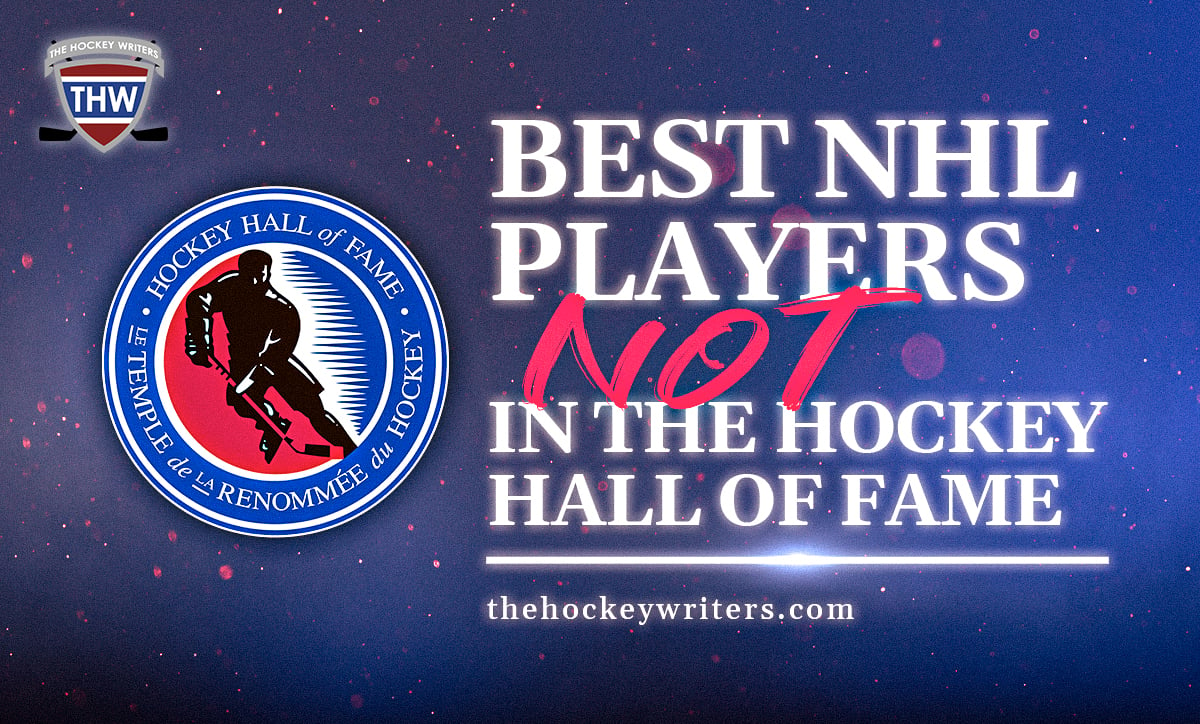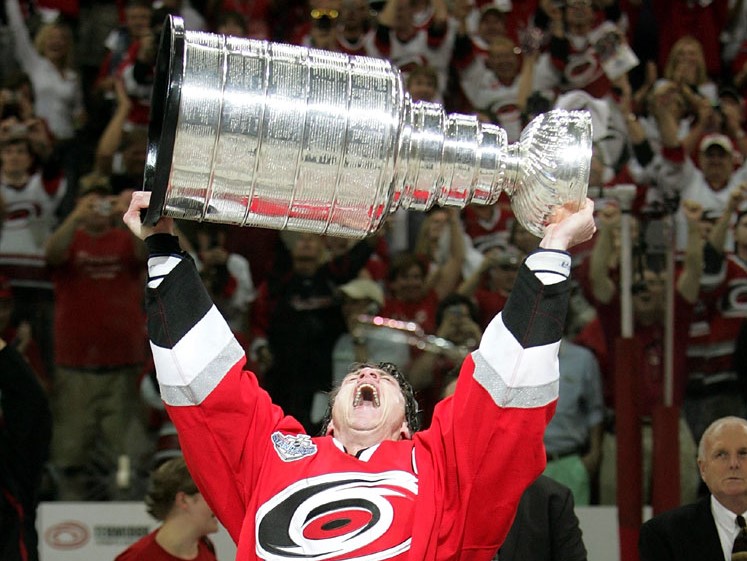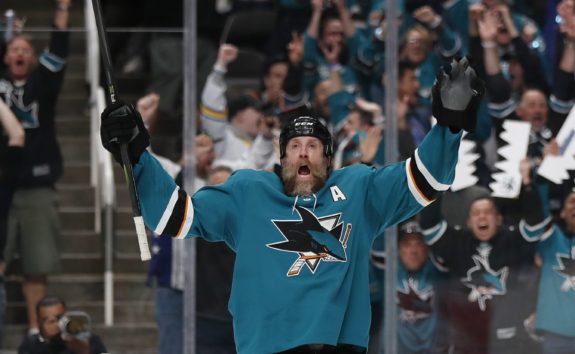Hockey fans love to argue, especially when it comes to their favorite players. Each year, the Hockey Hall of Fame (HHOF) inducts several new members, sparking debates across the hockey world about the merits of certain players throughout their careers.
This article is going to dive into the very best NHL players who are not in the Hockey Hall of Fame (only among eligible players of course), with a few bonus non-NHLers who the selection committee should absolutely include for their careers and contributions to the Women’s game as well.
Whether you’re a “Hall of Very Good” type fan who wants to see tons of names added to the Hall, or you’re a “Small Hall” purist who thinks only the absolute best should make it in each year (even if that means only one or two players are inducted some years), I think there are a few eligible players not currently in the hall that everyone should be able to agree on.
With all that out of the way, let’s dive in!

Ilya Kovalchuk
Ilya Kovalchuk is another player who appears to have missed out on being inducted into the Hall due to geopolitical conflict. However, he is a clear candidate in my eyes based on merit, especially when you consider it’s the “Hockey Hall of Fame” and not the “NHL Hall of Fame”.
Related: The NHL’s Top 100 Prospects – Midseason Update
Kovalchuk scored 40 or more goals in six consecutive seasons from the 2003-04 season until 2009-10. He won the Maurice “Rocket” Richard Trophy in the 2003-04 season and was top-10 in the NHL in goals eight times. Kovalchuk won Gold at the World Championships twice, at the World Junior Championship once, and at the Olympics once.
If you want raw numbers, he’s got those too. Kovalchuk scored 443 goals in the NHL, and sits at 38th all-time in goals per game (0.478), above Sidney Crosby, Teemu Selanne, Steve Yzerman, and more NHL legends. He would have scored even more goals in the NHL had he not spent as much time playing in the KHL where he sits as the 25th-highest scorer in league history and stands as one of just six KHL players to finish their careers above a point-per-game.
Henrik Zetterberg
What are we doing here? While he may not have the most impressive resumé when it comes to awards and other accolades, Henrik Zetterberg is a no-doubt Hall of Fame caliber player every day of the week. The best reason I can think of that he hasn’t made the Hall of Fame yet is that the arbitrary criteria used to judge “greatness” hasn’t yet lined up in his favor, though I’m confident it will eventually.
Zetterberg was one of the league’s best two-way forwards for much of his career, even as a chronic back injury slowed him down towards the end. Gaudy offensive numbers sure help with one’s Hall of Fame case, but Zetterberg’s reputation for professionalism, his unstoppable work ethic, and determination to be a positive factor for the Detroit Red Wings no matter what injury he was playing through should be more than enough to earn him a spot. At age 36, Zetterberg scored 68 points in 82 games on a terrible Red Wings team. The team finished with a combined +/- total of -187 while Zetterberg himself maintained a +15 rating.
Don’t forget, Zetterberg scored 960 points in the NHL and earned votes for the Frank J. Selke Trophy in 10 of his 15 seasons. He’s also a member of the triple gold club, with the Red Wings’ 2008 Stanley Cup victory sealing his membership. This is no charity case for a nice guy who played through a tough injury, this is one of the league’s greats who set the bar for work ethic and leadership across the league and had a remarkable career of his own.
Patrick Marleau
Patrick Marleau is an interesting case in HHOF discussions, with the conversation turning to the value of longevity versus dominance. Marleau was an excellent NHL player for most of his 23-year NHL career, scoring 40+ points 18 times. However, he only eclipsed 60 points on seven occasions.
Marleau is the NHL’s all-time leader in games played, surpassing the legendary Gordie Howe shortly before retiring, but does that automatically make him a strong enough player to crack the Hall of Fame or is it simply a testament to developments in training and nutrition as well as his pain tolerance or determination?
At the end of the day, he is 25th all-time in goals, and everyone who has scored more than that is either already in the Hall or is a shoe-in once they retire (Sidney Crosby and Alex Ovechkin). The ultimate question is if his stats are impressive enough or if they are somehow worth less because he took more games than anyone else in the history of the league to reach them?
I’m in the former camp at the moment and I think it’s silly to somehow de-value his final numbers because he played so many games. Plenty of other players would love to have played more games if they could have kept up, but nobody could keep up quite like Marleau did. Sure, I see the argument that he was very rarely among the greatest players in the league at any given time, but I think the magnitude of his career-long achievements will eventually be impossible to ignore and he’ll make it in sooner or later.
Sergei Gonchar
Sergei Gonchar rounds out our list of Russian players who would be in more serious consideration for the Hall of Fame if not for Russia’s continued invasion of Ukraine. Gonchar’s career is a bit underappreciated now, which is fitting given that was the story of his playing career as well. Life can be tough as a great two-way defender playing at the same time as Nicklas Lidstrom, who snatched up seven Norris Trophies as the league’s best defender as well as nine seasons as a top-six vote-getter. Gonchar was in the top-nine for Norris votes seven times, landing himself in the top-five at the end of four separate seasons.
Related: The NHL’s Best Farm Systems Ranked – Midseason Update
He was without a doubt one of the best defensemen in the game from roughly 1999-2008, and he won the Stanley Cup with the Pittsburgh Penguins in 2009. Gonchar played a ton of meaningful games as well, with 141 NHL playoff games to his name. He scored 90 points in the playoffs, which ties him for the 21th most by a defenseman in NHL history, and his 811 regular-season points are the 18th most by a defender in NHL history as well.
On merit, it’s tough to argue he wasn’t one of the best defenders of his era, even one of the best of all time, though I understand why the HHOF would overlook his case for now given how Russia has politicized their hockey success over the years.
Ryan Miller
Ryan Miller is a Hall of Famer in my eyes. He’s 16th all time in wins (11 of the guys with more wins are in the Hall already), won the Vezina Trophy as the league’s best goaltender in 2009-10 on a mediocre Buffalo Sabres team, and had the sort of air to him in his prime where you wondered how anyone would ever score on him once he got hot.
Miller spent most of his prime as one of the NHL’s best goalies on a bad Sabres team that only made the playoffs four times in his 11-year stint in Buffalo. He finished his time with the Sabres with a save percentage (SV%) of .916% across 540 games played, which is remarkable given the team’s lack of overall success.
His greatest accomplishment was his performance in the 2009-10 season where he won 41 games, had a .939 SV% and saved 36.2 goals above average according to Hockey Reference. Miller also placed fourth in Hart Trophy voting at the end of that season, cementing it as one of the best seasons of goaltending in the NHL’s Salary Cap Era. It was just past that season’s halfway point that Miller led Team USA to a Silver medal at the 2010 Olympics where he looked nearly unbeatable for most of the tournament before losing to Canada in overtime of the Gold Medal game.
At the end of his career, Miller had four seasons in the NHL’s top-10 for save percentage, seven years in the top-10 for saves, five for games played, four for wins, and five for shutouts. He was without a doubt one of the very best goaltenders of the post-lockout NHL and I think he deserves a spot in the Hall of Fame.
Curtis Joseph
Curtis Joseph (CuJo) is sort of like the Patrick Marleau of goaltenders when it comes to his Hall of Fame candidacy. He is seventh all-time in wins with 454, and there’s only one other goalie to reach 400+ NHL wins who isn’t in the Hall, Chris Osgood with 401. Joseph was top-five in Vezina voting five times, even landing at fourth in Hart Trophy voting in the 1998-99 season with the Toronto Maple Leafs.
He’s got a bit of an uphill battle given the fact that he was never the single best goalie in the league and doesn’t have much in his trophy case, but there’s no doubt that CuJo is one of the NHL’s greatest goalies over the course of his career. Much like Marleau, this comes down to how you value accumulated stats when they’re gathered over a very long career, and I tend to think that the goalie with the seventh most wins in the history of the NHL deserves a spot in the Hall of Fame.
Chris Osgood
Chris Osgood was a great NHL goalie for most of his career, though I’m not sure the peaks are high enough for him to force his way into the Hall of Fame. He only received Vezina votes four times, highlighted by him being the runner-up in the 1995-96 season. Osgood does have a pretty good trophy case to look back on, with three Stanley Cup victories, all coming with the Detroit Red Wings, and two William M. Jennings Trophies for being a goalie on the team that allowed the fewest goals in the NHL.

Osgood had some of his best moments in the playoffs, which should help his case. He was excellent in Detroit’s 1998 playoff run, winning 16 games with a .918 SV% to win the Cup, and he was borderline unbeatable in their 2008 Cup run where he had a .930 SV% and a goals against average (GAA) of 1.55. He then followed that up with a .926 SV% and a 2.01 GAA in the 2009 Playoffs where the Red Wings ultimately lost to the Penguins.
Are those legendary playoff runs enough to get Osgood into the Hall of Fame? Maybe, but I don’t think he’s going to go in ahead of Joseph or Miller at this point.
Pekka Rinne
Pekka Rinne has been eligible for the Hockey Hall of Fame for a few years now and while I don’t think he’s a lock for induction this year, he’s definitely someone I see making the cut sooner or later. Four appearances as a top-three finalist for the Vezina Trophy, a Vezina win in his age-35 season (2017-18), and four seasons earning Hart Trophy votes all say a lot.
Related: Every NHL Team’s Best Prospect – Midseason Update
Rinne currently stands at 21st all-time in NHL wins (369) and 19th in shutouts (60) with a career save percentage of .917%, which is excellent. He was the best player on a ton of mediocre Nashville Predators teams from the late 2000s to the 2010s and was instrumental in their run to the Stanley Cup Final in 2016-17 against the Penguins where they lost despite his .930 SV% and 1.96 GAA.
Keith Tkachuk
Keith Tkachuk is a prime candidate for induction soon if the aforementioned Russian players are not under serious consideration. He scored 538 goals (35th all-time) along with an impressive 2,219 penalty minutes (41st all-time). The prime of his career was during the NHL’s dead puck era, meaning he’d likely have far more impressive statistics if he had played in a different era. The biggest sign that he should be inducted is that all 34 players who scored more goals than him (aside from Ovechkin, Crosby, and Steven Stamkos) have already been inducted as well as many of the others who eclipsed 500 goals.
Rod Brind’Amour
Rod Brind’Amour is a strange case, as the calls for him to be inducted got significantly louder when he re-entered the public sphere as a head coach with the Carolina Hurricanes. Brind’Amour was a great player, scoring 1,184 points in the NHL and winning the Stanley Cup with the Hurricanes back in 2006.

He also won two Selke Trophies towards the end of his career. Brind’Amour was never an elite defensive-forward, and his Selke wins were mainly due to this tendency we have as hockey fans to put rose-colored glasses on and convince ourselves that great players go from elite offensive types early in their careers to great two-way players as they age. It happened with Steve Yzerman and is happening right now with Sidney Crosby. I’m not saying he didn’t deserve the wins, but he only received Selke votes five times in the previous 15 seasons, cracking the top-10 once.
I think he’ll eventually make it into the Hall, deservedly so, but I think he’s being remembered as a bit more of a dominant all-around player than he really was given the attention and respect he’s earned since returning to the limelight as the likable head coach he has shown himself to be.
Patrik Elias
Patrik Elias is another player who is a bit of a borderline Hall of Famer, with the first handful of years he played in the NHL taking place in the dead puck era. He still managed to put up really impressive numbers with the New Jersey Devils, scoring 1025 points in just over 1200 career games.
He won two Stanley Cups with the Devils, but never won any NHL hardware of his own which certainly doesn’t help his case. Hockey Reference’s era adjusted points metric puts Elias’ career point total at 1144 (69th in NHL history), which would help if you could get anyone on the HHOF selection committee to listen to or care about advanced analytics.
Female Players Who Should Be Inducted
The HHOF selection committee designated two spots on their ballots for Women back in 2010 so they didn’t need to compete for spots with the Men. They inducted two women that year, and never took advantage of both spots until the 2024 Class nearly 15 years later. This is a ridiculous trend that needs to be left in the past.
Meghan Duggan
Meghan Duggan’s case is another where it simply makes no sense why she hasn’t already been inducted. She had a phenomenal playing career, winning seven consecutive Gold medals at the World Championships, an Olympic Gold medal, and the Patty Kazmaier Award. She also captained the Boston Blades to a Clarkson Cup championship in the CWHL and played in the NWHL before retiring.
Duggan was also a champion for equality when it came to the working and training conditions for USA Hockey’s women’s program, a fight that will leave ripples through women’s hockey in the United States for years to come. She has since taken a position as the director of player development for the New Jersey Devils in the NHL.
Players Elected in the HHOF Class of 2025
Before you ask why I don’t have guys like Joe Thornton or Zdeno Chara on this list, remember that they were only just becoming eligible for the Hall of Fame as of this year. Other first-time eligibles are Carey Price, Duncan Keith, Tuukka Rask, and Ryan Getzlaf.
Thornton was a no-doubter, sitting at 7th all-time in career assists with 1,109, and 14th all-time in points with 1,539. Zdeno Chara has a good case as well, with the most games played by a defenseman in NHL history, to go with 680 career points, a Norris Trophy, a Stanley Cup ring, and a reputation as one of the game’s fiercest physical presences throughout his career.

Keith, Jennifer Botterill, Alexander Mogilny, Brianna Decker, Jack Parker, and Danielle Sauvageua were also named to the 2025 Hockey Hall of Fame class.
